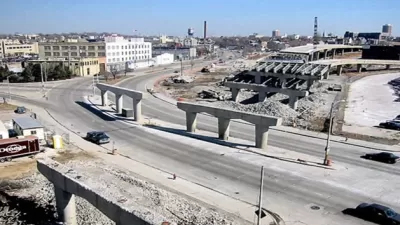As more planners begin to question the value of urban freeways, communities that have long borne the negative impacts of highway construction are fighting back with data.

Residents of Seattle's South Park neighborhood are calling on the state to remove a stretch of highway that community members argue creates air and noise pollution and uses valuable urban space that could be developed into housing, parks, or other uses. "More than 90% of South Park residents live near a contaminated site, Superfund project or freight corridor, compared with roughly 60% for the rest of the city." An article by David Kroman describes the efforts of one community advocacy group to pass legislation limiting highway expansion in communities already impacted by them.
"Local communities have, for decades, spoken out about the impacts of highways on where they live. In recent years, researchers have begun to quantify that impact." Washington-based advocacy organization Front and Centered worked with researchers to create a map that illustrates the disparate public health impacts of living in different parts of the state. "When the map was complete, the results were at once shocking and expected. Low-income and diverse communities near highways — in South King County, Tacoma, Yakima — consistently ranked the highest on a scale of 1 to 10, with 10 indicating the most risk. South Park is a 10."
According to the article, Front and Centered is promoting legislation that would use the map to evaluate highway expansion proposals and ban road expansion in areas with high risk ratings. Kroman describes the mixed opinions on the part of state legislators, who support attempts to redress the damage done by urban highways but express concern about goods movement, a key industry in Washington state.
In addition to working to get their legislation passed in a future legislative session, Front and Centered leaders hope the state will conduct a feasibility study to assess the potential for removing Highway 99.
FULL STORY: Seattle residents drive movement to tear out Highway 99 in South Park

Alabama: Trump Terminates Settlements for Black Communities Harmed By Raw Sewage
Trump deemed the landmark civil rights agreement “illegal DEI and environmental justice policy.”

Planetizen Federal Action Tracker
A weekly monitor of how Trump’s orders and actions are impacting planners and planning in America.

The 120 Year Old Tiny Home Villages That Sheltered San Francisco’s Earthquake Refugees
More than a century ago, San Francisco mobilized to house thousands of residents displaced by the 1906 earthquake. Could their strategy offer a model for the present?

In Both Crashes and Crime, Public Transportation is Far Safer than Driving
Contrary to popular assumptions, public transportation has far lower crash and crime rates than automobile travel. For safer communities, improve and encourage transit travel.

Report: Zoning Reforms Should Complement Nashville’s Ambitious Transit Plan
Without reform, restrictive zoning codes will limit the impact of the city’s planned transit expansion and could exclude some of the residents who depend on transit the most.

Judge Orders Release of Frozen IRA, IIJA Funding
The decision is a victory for environmental groups who charged that freezing funds for critical infrastructure and disaster response programs caused “real and irreparable harm” to communities.
Urban Design for Planners 1: Software Tools
This six-course series explores essential urban design concepts using open source software and equips planners with the tools they need to participate fully in the urban design process.
Planning for Universal Design
Learn the tools for implementing Universal Design in planning regulations.
Clanton & Associates, Inc.
Jessamine County Fiscal Court
Institute for Housing and Urban Development Studies (IHS)
City of Grandview
Harvard GSD Executive Education
Toledo-Lucas County Plan Commissions
Salt Lake City
NYU Wagner Graduate School of Public Service





























